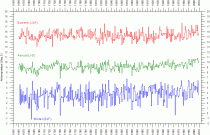By Dennis Ambler
As we are told of yet another “hottest year on record”, our daily news reports are full of “hot testimony”, for example the heat wave in Moscow, Russia is described in this report:
“The heat has caused asphalt to melt, boosted sales of air conditioners, ventilators, ice cream and beverages, and pushed grain prices up. Environmentalists are blaming the abnormally dry spell on climate change.
On ‘black’ Saturday, temperatures in Moscow hit a record high of 38 degrees Celsius with little relief at night, making this July the hottest month in 130 years. The average temperature in central Russia is 9 degrees above the seasonal norm.”
As usual, WWF regard this as proof of global warming,
“Certainly, such a long period of hot weather in unusual for central Russia. But the global tendency proves that in future, such climate abnormalities will become only more frequent”, says Alexey Kokorin, the Head of Climate and Energy Program of the World Wide Fund (WWF) Russia.
He fails, of course, to say what caused the previous heat wave of similar magnitude 130 years previously, as was mentioned in the report. Such is the nature of environmental reporting these days, that such questions equally do not arise in the minds of those willing reporters who swallow every crumb of global warming thrown to them. Never ever mentioned are historical instances such as the seven month long European heat wave of 1540, when the River Rhine dried up and the bed of the River Seine in Paris was used as a thoroughfare.
It seems to be axiomatic, that whilst reports such as the Moscow Heat wave make the headlines, there is scant reporting in the popular media of the severe cold in the South American winter, with loss of life and livelihoods, due to temperatures in some places reaching minus 15 celsius, or 5 deg F.
“The polar wave that has trapped the Southern Cone of South America has caused an estimated one hundred deaths and killed thousands of cattle, according to the latest reports on Monday from Argentina, south of Brazil, Uruguay, Paraguay, Chile and Bolivia.
Even the east of the country which is mostly sub-tropical climate has been exposed to frosts and almost zero freezing temperatures.”
But not to worry, it is still global warming, as explained by the Moscow head of WWF:
“I think that the heat we are suffering from now as well as very low temperatures we had this winter, are hydro-meteorological tendencies that are equally harmful for us as they both were caused by human impact on weather and the greenhouse effect which has grown steadily for the past 30-40 years.”
The “cold is hot” approach can be traced back to a working document by the UK Tyndall Centre for Climate Change back in 2004, when they said:
* Only the experience of positive temperature anomalies will be registered as indication of change, if the issue is framed as global warming.
* Both positive and negative temperature anomalies will be registered in experience as indication of change if the issue is framed as climate change.
* We propose that in those countries where climate change has become the predominant popular term for the phenomenon, unseasonably cold temperatures, for example, are also interpreted to reflect climate change/global warming.
It certainly works for WWF and the mainstream media, although surprisingly, the UK Guardian did a slight volte face when it changed a headline from:
“2010 on track to become warmest year ever” to the slightly less dramatic “2010 could be among warmest years recorded by man”
Since, by decree of James Hansen, there were no reliable thermometers prior to 1880, this is a pretty short record in the overall scheme of things. However the UK Central England Temperature Record goes back to 1659, when the “non-existent” Little Ice Age was producing extremely low temperatures, with winter averages barely above zero deg C.

A Press Release from 1698 could have said for example:
1698 - “Eight of the coldest years have occurred in the last 15 years”
An enterprising environmental journalist of the time could then have totally forgotten that period, and produced this headline, as temperatures recovered:
1733 - The UK has heated by a massive 3.2 degrees over the last 4 decades,
There are many more temperature periods where such specious claims can be made, if the right starting and ending points are selected and of course they are all meaningless, as are the current headlines. In fact the Central England temperature average for the thirty year period 1971-2000, was just 0.51 deg C higher than the thirty year period 1701-1730, some 270 years earlier. If you consider the impact of urban heat islands on the temperature record since that time, you can only ask, “what global warming”?
The average Central England summer average for 1961-90, the baseline period used by CRU, is actually -0.15 deg C lower than the summer average for 1721-1750, and under current definitions, thirty years counts as climate, but don’t tell anyone, it might spoil the story.
See story on SPPI here.




